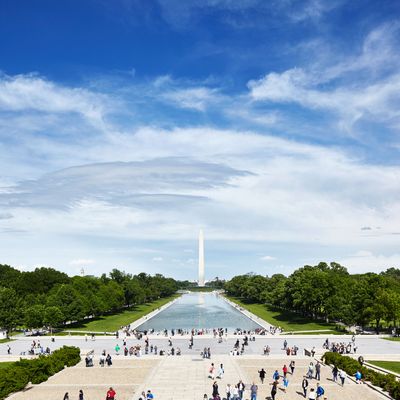
The presidency is the most powerful position in the country, but it could accidentally wind up with a new perk: the ability to cast electoral votes. That’s because, as a result of a constitutional quirk, the current push for D.C. statehood would leave a remnant federal district in which the White House might be the only permanent residence. It’s one of the more bizarre features of the long-running fight to grant congressional representation to the 700,000 taxpaying residents of the District of Columbia.
On Thursday, Democrats in the House passed a bill on a straight party-line vote that would carve almost all of what’s now Washington, D.C., out of the federal district and create a state called Washington, Douglass Commonwealth. (To not only differentiate it from the other state of Washington but to replace the more problematic associations to Christopher Columbus with that of abolitionist Frederick Douglass). It would get one voting member in the House and two Senate seats. Only 45 of the 50 Democratic senators have signed on to the proposal, and even if it gets a majority, the legislation would still be subject to a Republican-led filibuster that would take 60 votes to break.
Even assuming the legislation surmounts all these obstacles and a 51st state enters the Union, there is still one problem: D.C. statehood would still leave unaltered the 23rd Amendment to the Constitution, ratified in 1961, to give the district three electoral votes in presidential elections. The remnant federal district — including the White House, the Capitol, and the National Mall — would be an area of roughly two square miles that snake around downtown, avoiding homes and private businesses. Depending on who is camping out on the Mall any given night, the First Family at 1600 Pennsylvania Avenue could be the only residents in what’s left.
There’s no easy fix for such a scenario, because it would take a new constitutional amendment to undo the 23rd Amendment, which is far more difficult to pass than simple legislation. Each chamber of Congress would have to pass it by a two-thirds majority, and then it would have to be ratified by three-fourths of state legislatures. The result is a potential nightmare scenario in which a federal district exists where “zombie” electoral votes could be cast on behalf of people camping out on the Mall overnight for partisan political advantage. Eleanor Holmes Norton, D.C.’s nonvoting delegate to Congress, predicted less trouble if such a thing came to pass. “You will never see a passage of a bill as quickly as the 23rd Amendment [repeal] passes when that time comes,” she says.
Stephen Vladeck, a professor at the University of Texas School of Law who has studied the constitutional issues around this, said that even without repeal, the text of the amendment gives Congress the power to enforce it “by appropriate legislation.” This means that Congress could simply pass a bill by the normal legislative process to, for example, hand the district’s electoral votes to the winner of the national popular vote, absent a new amendment.
Some Republicans have used the 23rd Amendment as an argument against D.C. statehood, including Tom Cotton, who warned that without repeal, it would lead to “absurd consequences.” Most opponents of statehood don’t address this. Instead, they argue that D.C. is unworthy of being a state because of the false claim that it doesn’t have a car dealership (it does) or by citing its crime rate or simply because it would likely elect two Democratic senators. Vladeck noted that it is “the height of irony that an amendment designed to increase the rights of Washingtonians became the crutch or lever against statehood.”
Today’s push for D.C. statehood has made the most progress since the 1970s, when a constitutional amendment was passed by Congress to simply give the federal district full representation in Congress. This passed both chambers with the necessary two-thirds majority, including votes from prominent conservatives such as Bob Dole, Barry Goldwater, and Strom Thurmond, but it fell short of ratification in the states. Its failure was what prompted the current statehood proposal, through regular legislation, to make D.C. a state while leaving a vestigial federal district.
“I’m amazed that the statehood bill has come so far after only one session; it normally takes more than a session or two to get major legislation passed,” Norton said. “So I’m not at all discouraged that we didn’t do it all in one fell swoop.”





























